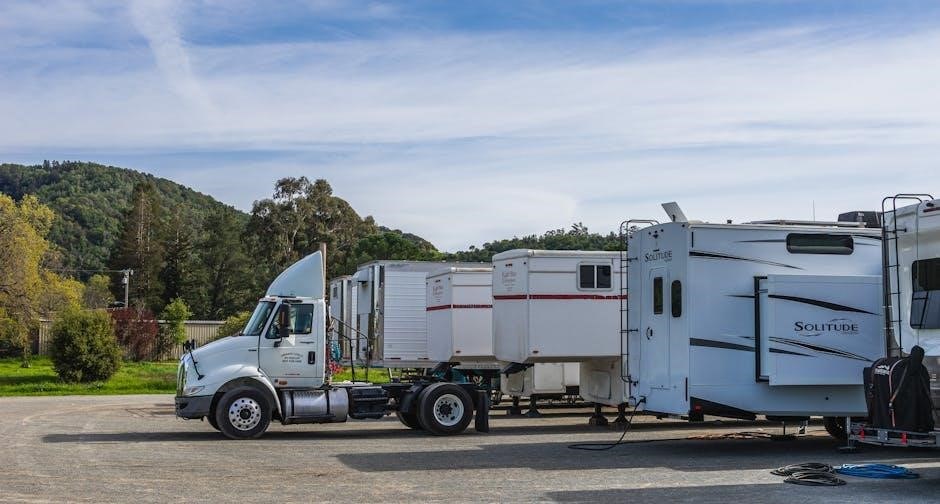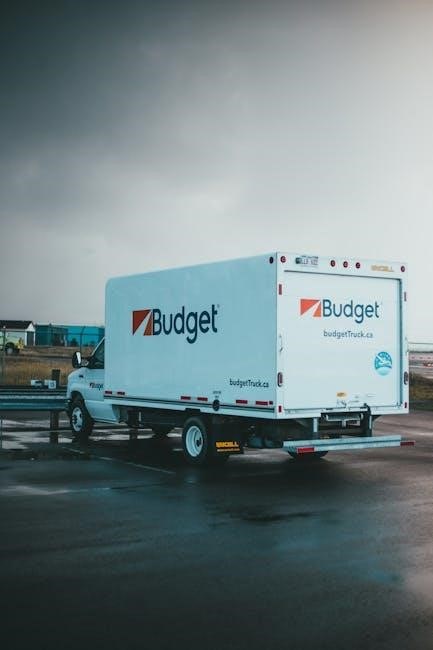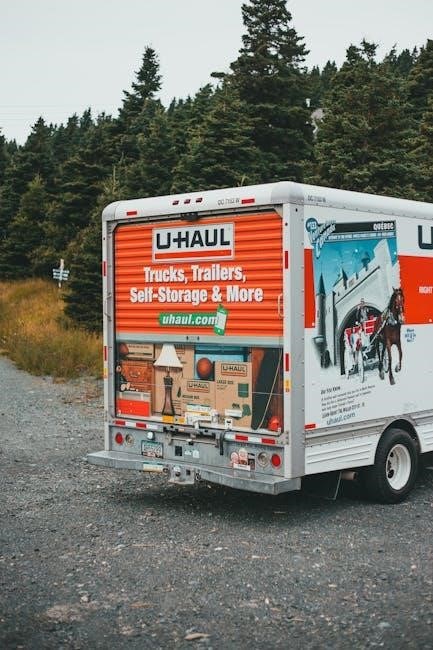A truck rental agreement is a contract between the renter and provider, outlining terms, conditions, and responsibilities for renting a vehicle. It ensures clarity and legal protection for both parties, covering details like payment, duration, and vehicle condition. Having a written agreement is essential to avoid disputes and ensure a smooth rental process.
Key Components of a Truck Rental Agreement
A truck rental agreement includes the rental period, payment terms, vehicle description, condition, insurance requirements, and liability clauses. It ensures both parties understand their responsibilities and obligations clearly.
2.1. Rental Period and Terms
The rental period specifies the duration for which the truck is rented, including start and end dates. Terms may include daily, weekly, or monthly rates and any extensions. It outlines the total rental duration and conditions for renewal or termination. This section ensures both parties agree on the timeframe and usage rules, preventing disputes. Clear terms help in scheduling and resource allocation for the renter and provider. Any changes must be mutually agreed upon and documented to maintain the agreement’s validity and enforceability.
2.2. Payment Terms and Conditions
Payment terms outline the total rental cost, payment methods, and due dates. They specify whether payments are due upfront, in installments, or at the end of the rental period. The agreement may include deposit requirements and refund conditions. Late payment penalties, additional fees, and acceptable payment methods (e.g., credit cards, checks) are typically detailed. This section ensures both parties understand their financial obligations, avoiding disputes over payments. It also clarifies how taxes, insurance, or other charges are handled, providing transparency and ensuring a smooth transaction process for both the renter and the provider.
2.3. Vehicle Description and Condition
This section provides detailed information about the rented vehicle, including its make, model, year, mileage, and Vehicle Identification Number (VIN). It documents the vehicle’s condition at the start of the rental, noting any existing damage or issues. Both parties acknowledge the vehicle’s state, ensuring accountability. The agreement may also outline responsibilities for maintenance during the rental period and procedures for reporting new damage. This transparency helps prevent disputes over vehicle condition upon return, ensuring a fair assessment of any changes that occurred during the rental term.

Benefits of Using a Truck Rental Agreement PDF
A truck rental agreement PDF provides portability, easy sharing, and secure storage. It ensures consistency and professionalism, with digital signatures enhancing convenience. PDFs are legally binding and easily archivable, reducing paperwork and disputes while maintaining a clear record of terms and conditions for both parties, ensuring transparency and accountability throughout the rental process.
3.1. Legal Protection for Both Parties
A truck rental agreement PDF ensures legal protection for both the renter and the provider. It clearly outlines responsibilities, payment terms, and vehicle conditions, minimizing disputes. The document serves as a legally binding contract, protecting the provider’s assets and ensuring the renter understands their obligations. Insurance requirements and liability clauses are included to safeguard both parties in case of accidents or damages. The PDF format maintains a permanent record, reducing fraud risks and providing a clear reference point for resolving conflicts. This legal framework fosters trust and accountability, ensuring both parties adhere to agreed terms and conditions throughout the rental period.
3.2. Clarity in Rental Terms
A truck rental agreement PDF provides clarity in rental terms, ensuring both parties understand their obligations. It outlines the rental duration, payment details, and vehicle condition, preventing misunderstandings. Clear terms specify responsibilities, such as maintenance and insurance, and define acceptable usage. This transparency helps avoid disputes by setting expectations upfront. The agreement also includes consequences for late payments or damages, ensuring accountability. By having all details in writing, renters and providers can easily reference the document, reducing confusion and promoting a smooth rental experience. Clarity in the agreement fosters trust and ensures a hassle-free process for both parties involved in the rental transaction.
3.3. Customization Options
A truck rental agreement PDF offers flexibility, allowing customization to meet specific needs. Users can add or replace text, incorporate new objects, and rearrange pages for clarity. Customization ensures the agreement reflects the unique terms of each rental, such as vehicle type, rental duration, and payment details. Additional information like insurance requirements or damage clauses can be included to provide comprehensive coverage. Watermarks and page numbers can also be added for professionalism and organization. This adaptability makes the PDF a versatile tool, enabling parties to tailor the agreement while maintaining its legal validity and ensuring all terms are clearly outlined. This flexibility enhances the document’s practicality and relevance for various rental scenarios.

Legal Considerations in Truck Rental Agreements
Legal considerations in truck rental agreements are essential for protecting both parties. Including insurance requirements and liability clauses ensures compliance with regulations and minimizes potential disputes.
4.1. Insurance Requirements
Insurance requirements are critical in truck rental agreements to protect both parties from potential risks. Renters must provide proof of valid insurance, including liability and collision coverage, to cover damages or injuries. The agreement should specify the types and minimum levels of insurance required. Failure to maintain adequate insurance may result in termination of the agreement or additional fees. Ensuring proper insurance coverage minimizes financial liability for both the renter and the provider in case of accidents or vehicle damage. Clear documentation of insurance details is essential to avoid disputes and ensure compliance with legal standards.
4.2. Liability and Damage Clauses
Liability and damage clauses in a truck rental agreement outline the responsibilities of both parties in case of damage or loss. The renter is typically liable for damages incurred during the rental period, except when caused by the provider’s negligence. These clauses specify the extent of liability, such as coverage limits, and may require additional insurance to protect against third-party claims. The agreement should also detail the process for reporting and assessing damage. Clear liability clauses ensure that both parties understand their obligations, reducing potential disputes. It’s crucial to outline these terms to safeguard against unforeseen incidents and financial losses. Proper documentation is essential.
How to Create a Truck Rental Agreement PDF
Create a truck rental agreement PDF by using a template, including essential clauses like rental terms, payment details, and liability clauses, and finalizing with signatures.
5.1. Choosing the Right Template
Selecting the right template is crucial for creating a comprehensive truck rental agreement PDF. Ensure the template is professional, customizable, and includes essential clauses like rental terms, payment details, and liability. Choose a template that aligns with your business needs and complies with local laws. Look for features like editable fields, digital signatures, and placeholders for vehicle details, insurance information, and rental periods. A well-structured template will save time and reduce errors. Additionally, consider templates that offer options for adding company branding or specific clauses required by your industry. Always verify that the template is legally binding and up-to-date with current regulations.
5.2. Including Essential Clauses
When drafting a truck rental agreement PDF, it is vital to include essential clauses that protect both parties and ensure clarity. Key clauses include rental duration, payment terms, vehicle description, insurance requirements, and liability for damages. Additionally, clauses regarding vehicle return conditions, late fees, and termination policies should be clearly outlined. Including a dispute resolution process and compliance with local laws is also crucial. These clauses ensure that the agreement is legally binding and provides a clear framework for resolving potential issues. A comprehensive set of clauses helps prevent misunderstandings and protects both the renter and provider throughout the rental period.
5.3. Final Review and Signature Process
The final review and signature process ensures both parties agree to the terms outlined in the truck rental agreement PDF. Both the renter and provider should carefully review the document to confirm accuracy and completeness. Once satisfied, signatures are obtained, along with dates, to validate the agreement legally. Witnesses may also sign to attest to the legitimacy of the process. Copies of the signed agreement are distributed to both parties for their records. This step ensures mutual understanding and accountability, completing the creation of the rental agreement. A thorough review and proper signing are essential to avoid future disputes and ensure enforceability.

Importance of Digital Signatures in Rental Agreements
Digital signatures play a crucial role in modern truck rental agreements, offering convenience, efficiency, and security. They eliminate the need for physical paperwork, allowing parties to sign agreements remotely and quickly. Digital signatures also ensure authenticity, as they are encrypted and legally binding in most jurisdictions. This reduces fraud risks and enhances trust between renters and providers. Additionally, digital signatures streamline record-keeping, making it easier to track and retrieve agreements when needed. By adopting digital signatures, both parties can complete the rental process faster while maintaining compliance with legal requirements. This modern approach aligns with the growing demand for efficient and secure transactions.

Industry Standards for Truck Rental Agreements
Industry standards for truck rental agreements ensure consistency and fairness in transactions. These standards typically include clear terms for vehicle maintenance, return conditions, and insurance requirements. They also outline expectations for payment structures and dispute resolution. Standardized agreements often reference guidelines from organizations like the American Trucking Associations or the Federal Motor Carrier Safety Administration (FMCSA). By adhering to these standards, rental companies can ensure compliance with legal and regulatory requirements. Additionally, industry standards help protect both parties by providing transparency and reducing ambiguity. They are regularly updated to reflect changes in laws, technology, and market practices, ensuring relevance and effectiveness. Uniformity is key to building trust and reliability in the rental process.

Common Mistakes to Avoid in Rental Agreements
Common mistakes in truck rental agreements include not customizing templates for specific needs, omitting critical details like insurance requirements, and failing to outline return conditions. Many agreements lack clear payment terms or damage assessment processes. Others may not specify liability clauses or maintenance responsibilities. Forgetting to include signatures or witness details can also invalidate contracts. Additionally, using outdated templates or ignoring local regulations is a frequent error. Ensuring all clauses are reviewed and understood by both parties is crucial. Addressing these oversights helps prevent disputes and ensures a smooth rental experience. Attention to detail is essential to avoid legal and financial complications down the line.

Best Practices for Drafting a Truck Rental Agreement
When drafting a truck rental agreement, ensure clarity and specificity by outlining all terms explicitly. Use a professional template and customize it to suit the rental scenario. Include detailed descriptions of the vehicle, rental duration, payment terms, and return conditions. Clearly define responsibilities for maintenance, insurance, and liability. Ensure all clauses are legally compliant and easy to understand. Proofread the document to eliminate ambiguities or errors. Have both parties review and agree to the terms before signing. Consider adding a section for digital signatures to streamline the process. Always ensure the agreement aligns with local laws and regulations to avoid legal disputes.

Future Trends in Truck Rental Agreements
The future of truck rental agreements is likely to be shaped by digital solutions, sustainability, and automation. Electronic signatures and digital contracts will become the norm, streamlining processes and reducing paperwork. Rental companies may adopt AI-driven systems to personalize agreements based on customer needs. With increasing environmental concerns, agreements may include clauses on electric or hybrid trucks. Blockchain technology could enhance security and transparency in rental transactions. Additionally, real-time vehicle tracking and predictive maintenance clauses may become standard. These trends aim to improve efficiency, reduce costs, and align with global sustainability goals, ensuring the industry remains competitive and adaptable to evolving demands.
A truck rental agreement is a vital document ensuring clarity and legal protection for both renters and providers. It outlines terms, payment details, vehicle condition, and responsibilities, preventing disputes. Using a PDF template offers customization and professionalism. Key elements like insurance, liability, and rental periods are essential for compliance. Digital signatures and clear language enhance security and accessibility. Regular reviews and updates ensure agreements adapt to industry changes. By understanding and drafting a comprehensive truck rental agreement, all parties can enjoy a smooth, transparent rental experience. This document remains a cornerstone of efficient and secure truck rental transactions in the modern era.

Additional Resources for Truck Rental Agreement Templates
For drafting a truck rental agreement, numerous online resources provide customizable PDF templates. Websites like LegalZoom, Template.net, and LawDepot offer professionally designed templates that cater to specific needs. These templates include essential clauses, such as rental periods, payment terms, and liability clauses, ensuring compliance with industry standards. Additionally, platforms like PandaDoc and DocuSign offer digital signature integration, streamlining the agreement process. These resources are invaluable for businesses and individuals seeking to create legally binding and clear truck rental agreements tailored to their requirements.